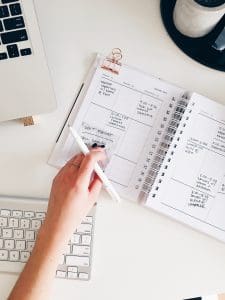
My Daily Journaling Experience
July 8, 2020 in Educate Yourself, LINKS
 About a year and a half ago, I started a morning journal. I had no clue how to structure it, or how it even came into fruition. I do love To Do lists, so I would have small journals that would contain my daily To Do’s. From there, I have progressively grown and evolved what has now become a crucial part to my morning routine, so much that when there’s no pen on paper for that day, the day is definitely off. Aside from figuring out what tasks I am to accomplish for the day, my journaling in the morning provides me with the mindset that I need to make it through. I wanted to share my key parts to my current journaling, in hopes that it may encourage you to start your own unique version!
About a year and a half ago, I started a morning journal. I had no clue how to structure it, or how it even came into fruition. I do love To Do lists, so I would have small journals that would contain my daily To Do’s. From there, I have progressively grown and evolved what has now become a crucial part to my morning routine, so much that when there’s no pen on paper for that day, the day is definitely off. Aside from figuring out what tasks I am to accomplish for the day, my journaling in the morning provides me with the mindset that I need to make it through. I wanted to share my key parts to my current journaling, in hopes that it may encourage you to start your own unique version!
Daily Podcasts
I like to have fresh new ideas of how I want to set up my day for success. Currently I listen to “Increase Your Impact” podcast by Justin Su’a and the “Daily Shine” podcast for meditation. Both are super short and are great to get me thinking about my intention that I want to set for the day. Building my day off of my intention reminds me of how I am working to be a better version of myself daily.
To Do List
This one is pretty self-explanatory, but seeing what needs to get accomplished for the day (and checking it off at the end of the day) helps me to prioritize my day. My “must be included tasks” in my daily To Do list will always have working out and reading.
 5 to Thrive
5 to Thrive
Adapted from Rachel Hollis, a wellness coach and brand that encourages self-improvement, the Five to Thrive is a daily action goal of five items. They include; waking up an hour earlier than normal to have to yourself (when I do my journaling), moving your body for at least 30 minutes a day, drinking half your bodyweight of water in fluid ounces, giving up one food that does not serve your body in a healthy way, and five things you are grateful for from the day. I like to reduce these items to “Wakeup, Workout, Water, Food, Gratitude,” and provide checkboxes to mark off when I do them for the day. This practice not only builds good habits in small ways, but also allows you to see your progress when you look at how many days you were able to check off your items.
Daily Gratitude
I love to write down five things that happened during the day that I am grateful for. Since I journal in the morning, I usually reflect on the previous day for my five items of gratitude. They can be anything from “the coffee at my favorite shop was delicious this morning” to “talking to a loved one on a huge conversation today.” Creating daily gratitude is so important to not only create a positive thought and feeling, but throughout the day I find myself thinking more about how this moment could be a part of my gratitude. Daily gratitude reframes your whole day, because it allows you to find the good even on bad days.
 Creating a better version of yourself is built in the daily minute moments of life, and daily journaling has worked for me to do that. There is no limit as to how you can set up your own daily journal, and you can make it uniquely your own. if that sounds too difficult, there are plenty of daily journals online that you can purchase that can guide you through your journal experience!
Creating a better version of yourself is built in the daily minute moments of life, and daily journaling has worked for me to do that. There is no limit as to how you can set up your own daily journal, and you can make it uniquely your own. if that sounds too difficult, there are plenty of daily journals online that you can purchase that can guide you through your journal experience!
Have you ever tried journaling? Do you have a specific part of the day you dedicate for yourself to practice self-growth?








Recent Comments